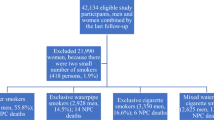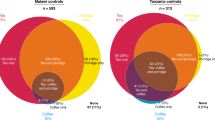Abstract
A case-control study was conducted on 88 incident cases of histologically confirmed undifferentiated nasopharyngeal carcinoma (NPC) in Zangwu County, China, and 176 age- sex- and neighbourhood-matched controls. The design of this study was defined after an anthropological survey on living habits in regions of high NPC incidence and the evidence of carcinogenic substances in some commonly consumed preserved foods. Subjects were interviewed regarding living conditions and diet in the year preceding the diagnosis of NPC and, with the help of their families, during childhood and weaning. After adjustment for a living conditions score to eliminate a confounding effect, an increased risk associated with consumption of salted fish during weaning and childhood was confirmed, especially for salted fish in rice porridge. The consumption of leafy vegetables was associated with a reduced risk for NPC, and consumption of melon seeds between 2 and 10 years of age with an increased risk. After multivariate analysis and adjustment according to the living conditions score, the consumption of salted fish in rice porridge before age 2 (OR = 3.8, P = 0.005), exposure to domestic woodfire (OR = 5.4, P = 0.01) and consumption of herbal tea (OR = 4.2, P = 0.02) were found to be independently related to the risk of NPC. The excess risk associated with the use of domestic wood fire increased if there were no windows in the house and with poor ventilation and cooking outside the house in a shack. As well as confirming the importance of the consumption of salted fish in childhood, this study has been the first to provide unequivocal evidence for two other factors implicated in increasing the risk of NPC in China, the adult consumption of traditional medicines (herbal tea) and exposure to domestic wood fumes.
This is a preview of subscription content, access via your institution
Access options
Subscribe to this journal
Receive 24 print issues and online access
$259.00 per year
only $10.79 per issue
Buy this article
- Purchase on Springer Link
- Instant access to full article PDF
Prices may be subject to local taxes which are calculated during checkout
Similar content being viewed by others
Author information
Authors and Affiliations
Rights and permissions
About this article
Cite this article
Zheng, Y., Tuppin, P., Hubert, A. et al. Environmental and dietary risk factors for nasopharyngeal carcinoma: a case-control study in Zangwu County, Guangxi, China. Br J Cancer 69, 508–514 (1994). https://doi.org/10.1038/bjc.1994.92
Issue Date:
DOI: https://doi.org/10.1038/bjc.1994.92
This article is cited by
-
Clinical Outcomes and Prognostic Factors of Locally Advanced Nasopharyngeal Cancer Treated with Intensity Modulated Radiotherapy: First Experience Report from Northeast India
Indian Journal of Otolaryngology and Head & Neck Surgery (2022)
-
Salted fish and processed foods intake and nasopharyngeal carcinoma risk: a dose–response meta-analysis of observational studies
European Archives of Oto-Rhino-Laryngology (2022)
-
Dietary fiber intake from fresh and preserved food and risk of nasopharyngeal carcinoma: observational evidence from a Chinese population
Nutrition Journal (2021)
-
Test-retest reliability of a computer-assisted self-administered questionnaire on early life exposure in a nasopharyngeal carcinoma case-control study
Scientific Reports (2018)
-
CYP2E1 polymorphisms and nasopharyngeal carcinoma risk: a meta-analysis
European Archives of Oto-Rhino-Laryngology (2017)



